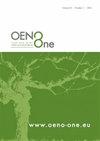Measuring wine and beer drinking experience in a context of limited socialisation: a case study with Spanish drinkers
IF 2.2
3区 农林科学
Q3 FOOD SCIENCE & TECHNOLOGY
引用次数: 0
Abstract
Drinking experience has gained the attention of researchers in recent years, mainly measured in different social-leisure contexts. However, no or very little, scientific attention has been paid to the drinking experience phenomenon when detached from the influence of the enjoyment of the social factor component. The objective of this study was to understand the wine and beer drinking experience during the pandemic confinement/lockdown and its relationship with the fear of the COVID-19 disease. A total of 423 Spanish participants were interviewed online to 1) measure their alcohol consumption, 2) explore their beer and wine drinking experience, and 3) evaluate their fears linked to COVID-19. The results firstly show that the dimensions (i.e., sensory, affective and cognitive) of the wine/beer drinking experience previously reported in social-leisure environments are similar to those found in a context with limited social interaction, such as the lockdown. Secondly, the drinking experience differs across participants and is related to their frequency of wine consumption. More frequent wine consumers show a cognitive-oriented experience, while affective and/or sensory experiences are related to lower wine consumption. Thirdly, the results show that the drinking experience is driven by fear linked to COVID-19, as it is higher in more affective-driven consumers. These results highlight the importance of the role of socialisation in the wine and beer drinking experience and how different drinking experiences are related to distinct levels of fear related to COVID-19.在社交有限的情况下衡量葡萄酒和啤酒的饮用体验:对西班牙饮酒者的案例研究
近年来,饮酒体验得到了研究人员的关注,主要是在不同的社会休闲背景下进行测量。然而,如果脱离社会因素的影响,人们对饮酒体验现象还没有或很少有科学的关注。本研究的目的是了解在大流行病隔离/封锁期间的葡萄酒和啤酒饮用体验及其与对 COVID-19 疾病的恐惧之间的关系。共对 423 名西班牙参与者进行了在线访谈,目的是:1)测量他们的饮酒量;2)探究他们饮用啤酒和葡萄酒的经历;3)评估他们对 COVID-19 的恐惧。研究结果首先表明,之前报道的在社交休闲环境中的葡萄酒/啤酒饮用体验的各个维度(即感官、情感和认知)与封锁等社交互动有限的环境中的体验相似。其次,不同参与者的饮酒体验各不相同,这与他们的葡萄酒消费频率有关。更频繁的葡萄酒消费显示出以认知为导向的体验,而情感和/或感官体验则与较低的葡萄酒消费量有关。第三,研究结果表明,饮酒体验是由与 COVID-19 相关的恐惧驱动的,因为情感驱动型消费者的饮酒体验更高。这些结果凸显了社会化在葡萄酒和啤酒饮用体验中的重要作用,以及不同的饮用体验如何与COVID-19相关的不同程度的恐惧相关。
本文章由计算机程序翻译,如有差异,请以英文原文为准。
求助全文
约1分钟内获得全文
求助全文
来源期刊

OENO One
Agricultural and Biological Sciences-Food Science
CiteScore
4.40
自引率
13.80%
发文量
85
审稿时长
13 weeks
期刊介绍:
OENO One is a peer-reviewed journal that publishes original research, reviews, mini-reviews, short communications, perspectives and spotlights in the areas of viticulture, grapevine physiology, genomics and genetics, oenology, winemaking technology and processes, wine chemistry and quality, analytical chemistry, microbiology, sensory and consumer sciences, safety and health. OENO One belongs to the International Viticulture and Enology Society - IVES, an academic association dedicated to viticulture and enology.
 求助内容:
求助内容: 应助结果提醒方式:
应助结果提醒方式:


